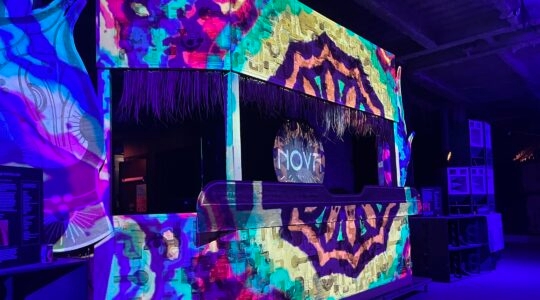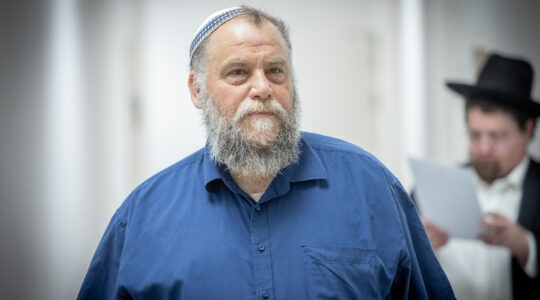TEL AVIV (JTA) — David Cohen doesn’t think Goldstar beer is bad — especially for a macro-brewed, industrial label that is Israel’s most popular.
But Cohen’s beer of choice comes from The Dancing Camel, the brewing company he started in 2006 at an old grain storage facility in an industrial area of Tel Aviv.
His beers have a distinctively Israeli flavor about them. There’s the Carobbean Stout, brewed with the ubiquitous Mediterranean carob; the Six-Thirteen Pomegranate Ale, released for the High Holidays (613 is the number of mitzvahs cited in the Torah); the Golem, a high-alcohol content beer; the Gordon Beach Blond, named for one of Tel Aviv’s beaches and spiced with rosemary and local mint; and the ‘Trog Wit, brewed after Sukkot and using etrogs.
“It’s a fun fruit to work with,” Cohen said of the brew, which contains a walnut-sized piece of etrog in every bottle.
A former accountant and New Jersey native, Cohen is one of a growing number of micro-brewers in Israel. Aside from the Dancing Camel, which produces about 7,500 liters of beer per month, there’s Haifa’s LiBira brewery, the Golan Brewery in the Golan Heights, Canaan Beer from Ma’ale Adumim, in the West Bank, and Malka Beer in the western Galilee — not to mention home breweries throughout the country.
Israeli beer experts say the Jewish state is going through something of a beer awakening. While the average Israeli consumes only 13 liters of beer per year — compared to an estimated 85 liters annually for Americans — beer consumption is growing.
Shachar Hertz, owner of Beer Master, which organizes beer-related events in Israel for beer aficionados, brewers and importers, projects a 50 percent growth in Israeli beer consumption over the coming decade. Hertz and others say beer is following the model of wine in Israel, where the development of unique, local wines fueled significant growth in wine consumption over the past decade. Now it’s happening to beer, thanks in part to microbreweries.
“The revolution started exactly as in the wine industry,” said Guy Zuckerman, alcohol category manager at Tempo Beverages, which brews Israel’s two national beer labels, Goldstar and Maccabee.
Overall, Goldstar remains Israel’s beer leader, with 27 percent of market share, according to Zuckerman. Carlsberg is the country’s second favorite brand at 19 percent, followed by Maccabee at 13 percent and Heineken at 11 percent.
The emergence of the neighborhood pub over the past few years in urban centers such as Tel Aviv, Haifa and Jerusalem has helped fuel beer consumption, Zuckerman said.
“People moved to these cool, quiet neighborhood bars and drink beer,” he said.
The increased interest in hand-crafted brews has benefited Israel’s major beer players by promoting beer consumption generally. Tempo even sponsors and mentors some home brewers, and the company runs a competition for them.
A variety of microbrewers showed up at a beer festival held in early October at Kibbutz Ma’abarot’s House of Wine.
One was Denny Neilson, an American expatriate who runs a shop for home brewers in the Jerusalem suburb of Mevasseret Zion called The Winemaker. The house line of beers, available in 10 varieties, is called Isra-Ale. It carried top honors at the Ma’abarot festival. Neilson also teaches classes on brewing.
Neilson said one of his main challenges in setting up shop was dealing with the bureaucratic processes he needed to acquire the proper permits. Most home brewers don’t bother with permits, he said, making 19-liter batches in their kitchens.
For the time being, microbrews remain a boutique item in Israel. Since they are not pasteurized, they don’t travel or store well and tend to be available only at upscale alcohol shops, bars and restaurants.
But it may be only a matter of time before the microbrews go mainstream.
“Eventually,” Zuckerman said, “the know-how will catch up.”





